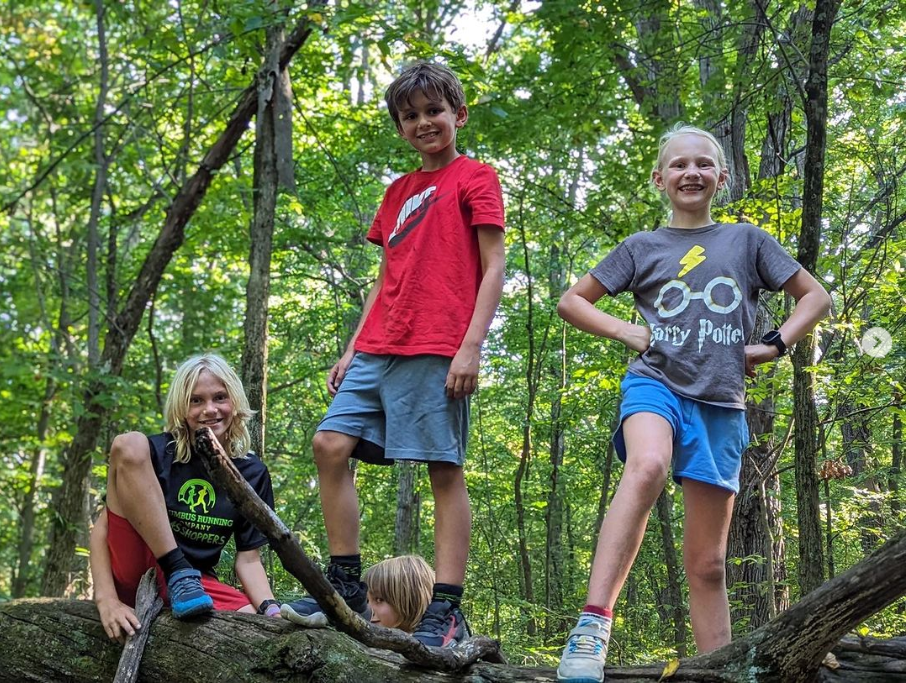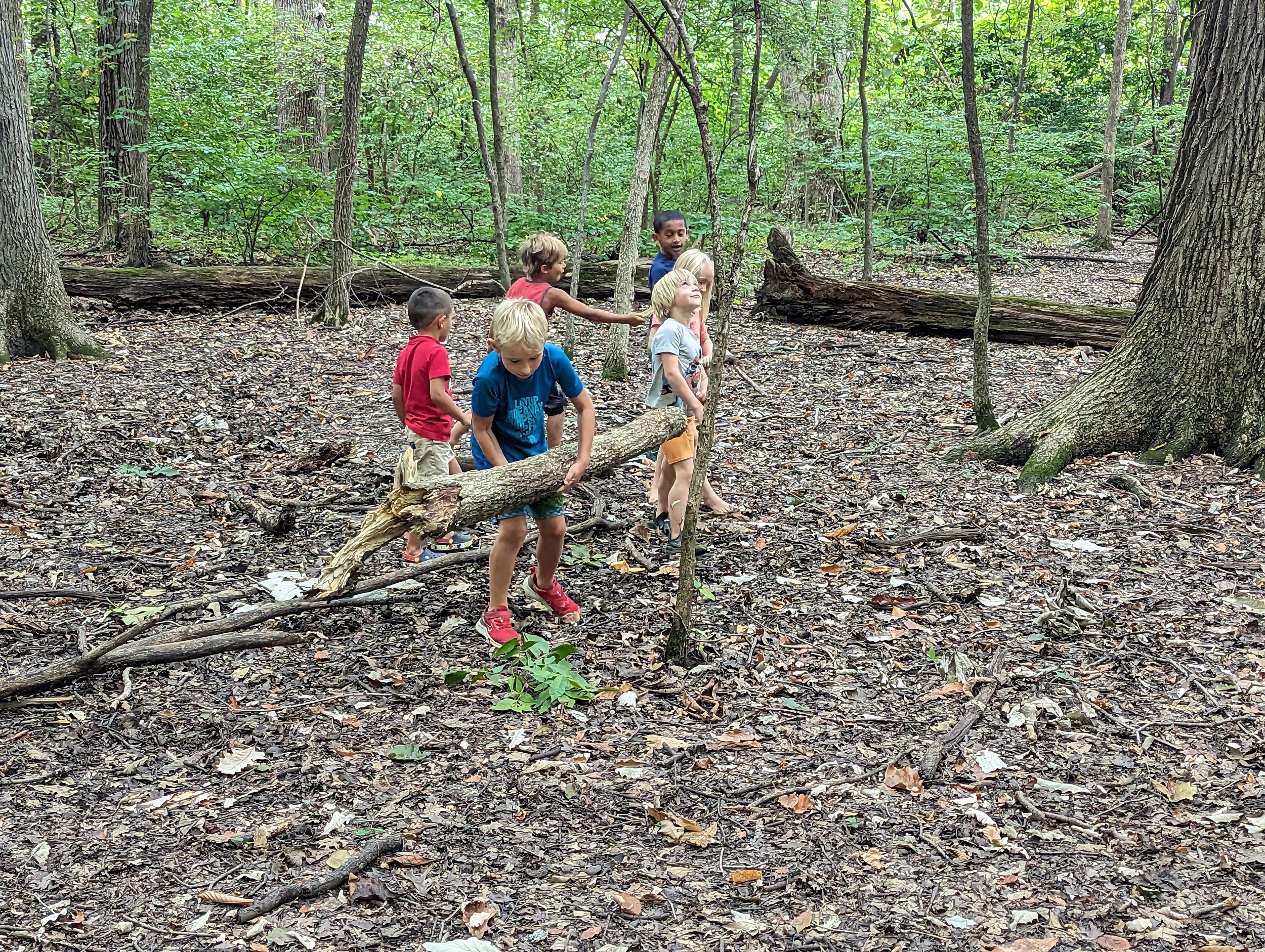Unstructured Play: Lessons from Waldorf Education
Waldorf education, a century-old philosophy rooted in the principles of Rudolf Steiner, emphasizes holistic child development through hands-on, experiential learning and unstructured play. In Waldorf classrooms, time spent outdoors and engaging in imaginative play is not seen as a break from learning but as an integral part of it. This approach aligns closely with our practices at Acton Academy Columbus, where learners are immersed in over an hour of outdoor, unstructured play every day. From building forts in the woods to designing their own games, our learners thrive in a setting where play and nature are woven into the fabric of their education.
Like Waldorf schools, we believe that unstructured play in nature fosters creativity, resilience, and a deep connection to the world around us. This belief is not just intuitive—it is supported by a growing body of research that highlights the cognitive, physical, and emotional benefits of child-led play in natural settings.
The Power of Unstructured Play: How Acton Academy Columbus Embraces Outdoor Learning
At Acton Academy Columbus, we prioritize unstructured play in natural settings, recognizing its profound impact on children's development. Our learners engage in activities such as building forts in the woods, exploring creeks, and creating their own games, spending over an hour outdoors daily across all four seasons. This approach is deeply rooted in research highlighting the multifaceted benefits of unstructured play in nature.
Research
1. Cognitive Development Through Unstructured Play
Unstructured play fosters creativity, problem-solving, and executive function skills. The American Academy of Pediatrics emphasizes that such play enhances cognitive abilities and emotional resilience, serving as a crucial component of healthy brain development.
Moreover, a systematic review published in PLOS ONE found that unstructured nature play positively influences physical activity levels and cognitive development in early childhood.
2. Mental Health Benefits of Nature Exposure
Regular interaction with natural environments has been linked to improved mental health outcomes in children and adolescents. A systematic review in the Journal of Epidemiology & Community Health concluded that access to and engagement with nature are associated with enhanced emotional well-being and reduced symptoms of attention deficit disorders.
In addition, time in nature reduces stress and anxiety, improves mood, and fosters a sense of calm. A study in Frontiers in Psychology highlights the restorative effects of nature, particularly in reducing symptoms of ADHD and improving overall emotional regulation.
Lastly, research in the British Journal of Psychiatry indicates that nature exposure can alleviate stress and anxiety, contributing to overall mental well-being.
3. Social and Emotional Learning
Unstructured play in natural settings encourages collaboration, communication, and emotional regulation. The American Psychological Association notes that such play is essential for social competence, helping children develop skills like negotiation, leadership, and conflict resolution.
Year-Round Outdoor Engagement
At Acton Academy Columbus, we embrace outdoor play in all seasons, understanding that each offers unique learning opportunities. This consistent engagement with nature not only enriches the educational experience but also fosters adaptability and a deep appreciation for the environment.
Why Unstructured Play Matters
Unstructured play is child-led, open-ended, and imaginative. It allows children the freedom to explore and interact with their environment on their own terms, which is vital for their physical, social, and emotional growth. According to a study published in the Journal of Pediatrics, unstructured play improves problem-solving skills, promotes resilience, and fosters creativity.
At Acton Academy Columbus, this philosophy is at the core of our learning approach. By encouraging our learners to play in the woods, build forts, and create their own games, we’re providing them with opportunities to develop these critical life skills in ways that structured activities cannot replicate.
Acton’s Commitment to Outdoor Play
Our learners engage in a variety of outdoor activities year-round, embracing the changing seasons and all the opportunities they bring:
Playing in the Woods
Learners climb trees, build forts, and explore the forest floor, engaging their senses and sparking curiosity. They work together to solve problems, like how to construct a sturdy fort or navigate a challenging terrain.Creek Adventures
The creek is a favorite outdoor classroom. Learners splash, explore water currents, and discover the creatures that live beneath the surface. These experiences not only ignite scientific curiosity but also foster a deep connection to the natural world.Building and Designing Games
Whether they’re inventing new tag games or creating obstacle courses with logs, ropes, and natural materials, learners develop creativity and engineering skills. They also practice leadership as they guide their peers through the challenges they’ve built.
Outdoor Play in All Four Seasons
At Acton Academy Columbus, we believe in the mantra, “There’s no such thing as bad weather, only inappropriate clothing.” This mindset teaches resilience and adaptability. Here’s how our learners embrace each season:
Snow / cold: Snow transforms our campus into a wonderland of creativity. Learners build snow forts, design icy obstacle courses, bring their sleds and learn to appreciate the quiet beauty of a frosty morning.
Warm: Warmer days bring muddy creek adventures, scavenger hunts, and opportunities to observe budding trees and emerging wildlife.
Rain: There is true joy in playing in puddles!
How Nature Play Builds Lifelong Skills
Time outdoors doesn’t just benefit learners today; it prepares them for the future. Here’s how:
Critical Thinking and Problem-Solving
Outdoor challenges, such as crossing a stream or designing a fort, encourage learners to think on their feet and find creative solutions.Collaboration and Leadership
Learners work together to create games, establish rules, and build structures. These interactions build communication skills and foster leadership.Resilience and Risk-Taking
Climbing trees, testing the strength of a fort, or trying a new obstacle in a course builds resilience. Learners learn to assess risks and build confidence in their abilities.Environmental Stewardship
Daily exposure to the natural world instills a sense of responsibility for protecting it. Learners develop an understanding of ecosystems, wildlife, and the importance of sustainable practices.
Unstructured Play and the Acton Approach
At Acton Academy Columbus, our commitment to unstructured play complements our learner-driven education model. Just as learners take ownership of their academic journey, they also lead their outdoor explorations. This autonomy empowers them to grow as self-directed, curious, and capable individuals.
Join Us in Embracing the Outdoors
The benefits of unstructured play in nature are undeniable—and they’re a cornerstone of the Acton Academy Columbus experience. We’re proud to provide a learning environment where children can explore, create, and connect with the world around them every single day.
To learn more about how our outdoor play philosophy helps learners thrive, or to schedule a visit, contact us today. Watch as learners splash in the creek, design their own games, and experience the joy of unstructured play in all its forms. Together, we can cultivate a generation of resilient, creative, and environmentally conscious leaders.








